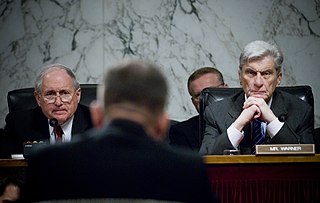Related Research Articles
The United States Constitution provides that each "House may determine the Rules of its Proceedings," therefore each Congress of the United States, upon convening, approves its own governing rules of procedure. This clause has been interpreted by the courts to mean that a new Congress is not bound by the rules of proceedings of the previous Congress.

A congressional committee is a legislative sub-organization in the United States Congress that handles a specific duty. Committee membership enables members to develop specialized knowledge of the matters under their jurisdiction. As "little legislatures", the committees monitor on-going governmental operations, identify issues suitable for legislative review, gather and evaluate information, and recommend courses of action to their parent body. Woodrow Wilson once wrote, "it is not far from the truth to say that Congress in session is Congress on public exhibition, whilst Congress in its committee rooms is Congress at work." It is neither expected nor possible that a member of Congress be an expert on all matters and subject areas that come before Congress. Congressional committees provide valuable informational services to Congress by investigating and reporting about specialized subjects.
A select or special committee of the United States Congress is a congressional committee appointed to perform a special function that is beyond the authority or capacity of a standing committee. A select committee is usually created by a resolution that outlines its duties and powers and the procedures for appointing members. Select and special committees are often investigative in nature, rather than legislative, though some select and special committees have the authority to draft and report legislation.
The U.S. House Committee on Transportation and Infrastructure is a standing committee of the United States House of Representatives.

The U.S. House Committee on Homeland Security is a standing committee of the United States House of Representatives. Its responsibilities include U.S. security legislation and oversight of the Department of Homeland Security.

The United States House Committee on House Administration deals with the general administration matters of the United States House of Representatives.
Congressional oversight is oversight by the United States Congress over the Executive Branch, including the numerous U.S. federal agencies. Congressional oversight includes the review, monitoring, and supervision of federal agencies, programs, activities, and policy implementation. Congress exercises this power largely through its congressional committee system. Oversight also occurs in a wide variety of congressional activities and contexts. These include authorization, appropriations, investigative, and legislative hearings by standing committees; specialized investigations by select committees; and reviews and studies by congressional support agencies and staff.
The United States House Committee on Small Business is a standing committee of the United States House of Representatives.
The United States House Committee on Expenditures in the Navy Department is a defunct a committee of the U.S. House of Representatives.
The United States House Committee on Accounts was a standing committee of the US House of Representatives from 1803 to 1946. It had purview over the financial accounts of the House's contingent fund, as well as some matters related to facilities and staffing. In 1946, it was merged into the newly formed the Committee on House Administration.
The United States House Committee on Ventilation and Acoustics is a former standing committee of the United States House of Representatives.
The United States House Committee on the Disposition of Executive Papers is a former standing committee of the United States House of Representatives.
The United States House Committee on Enrolled Bills is a former standing committee of the United States House of Representatives.
The United States House Committee on Mines and Mining is a defunct committee of the U.S. House of Representatives.
The United States House Committee on Post Office and Post Roads was a congressional committee which existed until 1946. A Select Committee on the Post Office and Post Roads was established in 1806 and made a standing committee in 1808 during the 10th Congress. The early membership of the committee consisted of one Member from each state.
The Joint Committee on Enrolled Bills was a joint committee of the United States Congress operating from 1789 to 1876. It was one of the first standing committees established by Congress, having been created July 27, 1789 during the 1st Congress.
The Committee on Alcoholic Liquor Traffic was a standing committee of the U.S. House of Representatives from 1893 to 1927. It was preceded by a select committee formed in 1879 during the 46th Congress.
The United States House Committee on Merchant Marine and Fisheries is a defunct committee of the U.S. House of Representatives.
The Committee on Woman Suffrage, was a committee of the United States House of Representatives between 1917 and 1927. The committee was influential in shepherding through the ratification of the 19th Amendment to the United States Constitution giving women the right to vote.
References
![]()
The public domain consists of all the creative work to which no exclusive intellectual property rights apply. Those rights may have expired, been forfeited, expressly waived, or may be inapplicable.
- ↑ "U.S. House of Representatives. Committee on Engraving. 1844-1860". National Archives and Records Administration. Retrieved 7 April 2017.